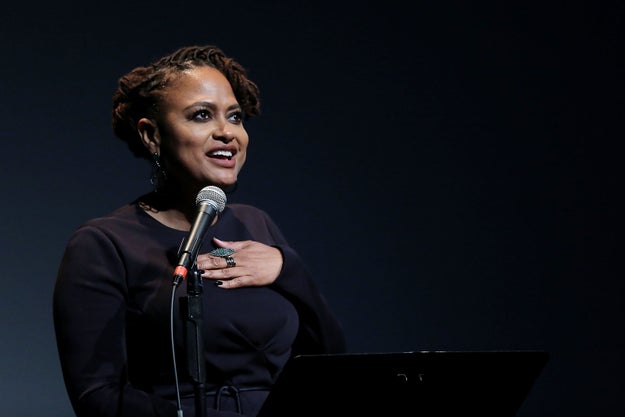
Ava DuVernay at the New York Film Festival premiere of her Netflix documentary 13th. Marion Curtis/Netflix
Ava DuVernay’s documentary13th argues that black grief is tied to modern legal enslavement. The film, which hits Netflix on Oct. 9, is about how the 13th Amendment freed slaves but held an exception for criminals that has since been exploited. DuVernay’s premise is that with 40% of incarcerated people being black, 1 in 3 black men in America will experience this legal form of slavery in their lifetimes.
One debate in 13th is whether videos showing police brutality should be seen by the public — a conversation mirrored by media observers as more videos come to light. DuVernay chose to include them — but made it a practice to ask for permission from the victims’ families to use the footage, first.
“I just lost my father who I was… am very close to, less than six months ago,” DuVernay said in early October at a press conference for the film before it opened the 54th Annual New York Film Festival. “As I was making this, I always struggled with whether or not to show the cell phone video, or liquor store video, or whatever. … In the context of my father’s death, I just thought about, If there was video of those last moments in the hospital, how dare someone use it? I would be furious, so I just couldn’t, so we had to get in touch.”
DuVernay made an effort to be part of the reaching out process. She told reporters that she “called the first one and it was really too much for me to do and finish the film… because I couldn’t function in that space.” She added, “It was so dark to be in a place and hear their stories and it was like… it’s another documentary really.”
DuVernay’s sister Tara, who was the chief researcher on 13th, ended up taking on the difficult task of connecting with the families. “She is a mother, and she was able to have hours and hours on the phone with the folks who gave the video. But it was so immersive when you call them,” DuVernay explained. “You can’t just call them and say what it is; you have to talk to them and listen.”
DuVernay later mentioned that not every victim’s family was on board with being a part of the documentary. “There are folks who said no. I had called someone who had originally said no. I said, ‘Let me try and call and do the final push,’ and I couldn’t even do the final push. She said, ‘I don’t have any choice where this is, and if you’re giving me a choice I say no because I don’t want this everywhere and I don’t have a choice,’” DuVernay recalled.
“I could have used it, it’s public domain, one of them is public domain. Many people own the footage. If you are the bystander, that footage is yours. Some people have sold it to news organizations, but we didn’t use it,” she said. “That’s why I put the debate about whether to use it or not in there, because the idea about black trauma and black death as spectacle is a real question in the community, in the activist community.”
Ava DuVernay and her family at the 54th New York Film Festival. Jamie Mccarthy / Getty Images



